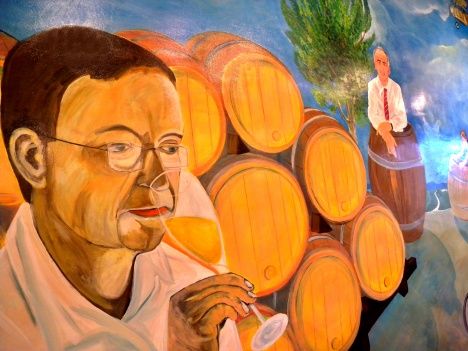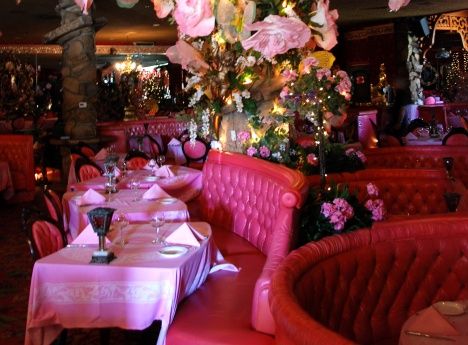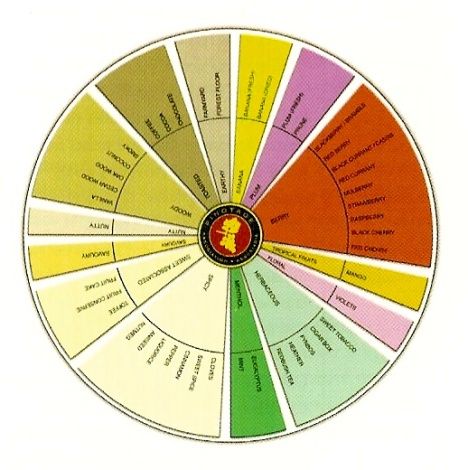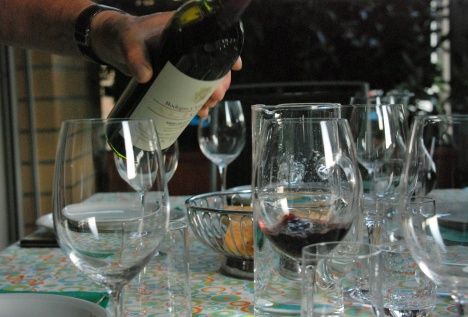Two hundred times so far I have recorded my thoughts about wine in this column, hardly leaving out a topic that is (even remotely) related to wine. Yet there is one word that I have probably used most often but never made the central theme: enjoyment and all the terms related to enjoyment. "Enjoyment is something positive. If you close your eyes and think of something beautiful, enjoyable, your soul starts to vibrate," says psychologist and enjoyment researcher Rainer Lutz (University of Marburg). But how do you describe a "vibrating soul"? I don't know. That's probably why I have so far left it at talking about the feeling of enjoyment, and tacitly assumed that all column readers know what is meant by enjoyment. Do they really know? Better still, do I know it at all? Or is it a perceived well-being that can only be experienced but not (or hardly) described?
 |
| Painting in the Champagne Museum in Reims (Photo: P. Züllig) |
In such cases, I often consult Lexicon and find the following classification of pleasure:
That brings us a little closer to the point. Pleasure actually (also) has to do with drinkable things, in this case with wine. So the term so often used cannot be entirely wrong. And it is a positive perception of something that is perceived as beautiful, defines the Lexicon. This is where it already gets difficult: what is "beautiful"? Anyone who remembers endless discussions about the beauty of works of art hardly dares to make a statement. In the area of food and drink, there is a similar term to "beautiful" that is difficult to define: "delicious". What is delicious? A "delicious" little wine, perhaps? A terrible idea to describe a wine like that, and yet the signal is somehow understandable: a wine that gives pleasure and well-being. But what gives pleasure and well-being to whom? Is it possible to say anything general? Hardly! And yet consumers want to know more about this. They want to know: Is it worth buying a wine or pouring a wine? Will it give pleasure? And what kind of pleasure?
 |
| Fantasy world in a gourmet temple in Sonoma (Photo: P. Züllig) |
Sensory pleasures, of course, because wine enjoyment is all about the senses, primarily the senses of smell and taste. The senses of sight and touch, which otherwise play a leading role in humans, play a rather subordinate role here. It is not for nothing that wine lovers put their nose in the glass first. This is also where the first confusion arises. How does the wine smell - or shall we say: smell -? There are hardly any - or only a few - terms for this. One helps oneself with analogies: it smells like... and then comes an almost infinitely long list of things that emit odours, pleasant and less pleasant, familiar and unfamiliar, unambiguous and enigmatic... Which of these smells give pleasure and which cause disgust or even revulsion? Is what smells like boiling tar still a pleasure or already disgusting? What about horse stables or even cat piss? Is one even able to separate the smell from the source we know (from which it emanates)?
 |
| Aroma wheel - the attempt% to get a grip on the aromas (Photo: P. Züllig) |
To the best of my recollection, I have never put so many question marks in a column before. The reader of a wine magazine makes it much easier for himself: "The word creations of wine experts are often ridiculous to embarrassing... Dear analysts and experts, please let me form my own opinion, because I know what I smell and that's enough for me". Is it really enough or doesn't the wine consumer want to know a little more precisely whether a wine also gives or could give pleasure? Or is the reputation of a winery, a high price or the number of points awarded by renowned wine critics enough to guarantee enjoyment? Hardly!
When it comes to enjoying wine, it is not only the nose that is involved, but also the sense of taste. This is where the game of expectations of enjoyment begins anew: How should something taste in order to be judged as beautiful - or delicious? Once again, the reader's letter writer quoted above comments: "It is rather difficult with 'engaging evolution on the palate' (Darwin sends his regards)... Always horny, sexy, pure eroticism - I would rather have this with the fellow drinker!" But the problem cannot be solved with casual sayings. Pleasure is anything but easy to define. And - hand on heart - when does pleasure become an addiction (another question mark)? Let's stick to science to answer the question of what triggers pleasure in the mind. It is "the neurotransmitter dopamine released in the brain that triggers a happiness kick and controls our behaviour. A group of researchers from the University of Alabama at Birmingham has deciphered how individual nerve cells in the brain remember such pleasures. Using rats, they were able to show for the first time that genes that play a role in memories are chemically - epigenetically - altered during the process." Comprehended?
 |
| Ready to eat and drink (Photo: P. Züllig) |
Hardly! After all, wine drinkers are not rats, so maybe it works for them in a similar way to rats, or maybe not. Let's leave science and return to pleasure, to that feeling of happiness that is not only difficult to define but even more difficult to predict. Will it come or go with this or that wine (I assure you, this is the last question mark in this column)? That's what one would like to know (as authoritatively as possible).
Enjoyment is not an attribute of wine, it rather presupposes man's capacity for enjoyment and is closely linked to the sensations and experience of the consumer: If one likes what one smells, feels, tastes, sees, enjoyment comes on the scene of its own accord. "Pleasure is pleasurable, sensual and always related to one's own self. Every person will name something different, will cite different experiences when describing pleasure or individual moments of pleasure," says the pleasure researcher.
If you have now read along with pleasure and gathered new, positive experiences in the process, if you find the time to think about it and pay attention to your feelings (because pleasure takes time), if pleasure becomes everyday for you and doesn't have to wait to be admitted, then (almost) all question marks will dissolve - and so this column and your next wine can also become a pleasure.
Enjoy
Yours/Yours